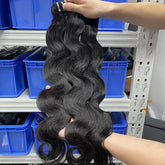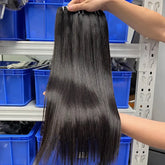How to Become a Hair Distributor: A Guide for Aspiring Black-Owned Hair Businesses
Starting a career as a hair distributor in the black-owned beauty business sector offers not only profitability but also the opportunity to create influence and celebrate culture. This guide provides a step-by-step path to help you start a hair distribution business designed to thrive within a growing and competitive market. Here’s everything you need to know:
1. Why Becoming a Hair Distributor Is Important
As a hair distributor, particularly in the black-owned business space, you play a key role in providing access to quality hair products that meet the unique needs of Black consumers. Distributors are the bridge between manufacturers and retailers or end-users, often helping to maintain quality standards, foster industry growth, and support culturally relevant hair care needs.
2. Conducting Market Research
To succeed as a hair distributor, deep knowledge of industry trends and market demand is essential. Focus on researching:
- Popular Hair Types and Textures: Understand what types of hair products, such as human hair extensions, wigs, and natural hair products, are most sought after.
- Consumer Trends: Stay up-to-date with style trends, demand for sustainable and ethical sourcing, and shifts in consumer preferences.
- Target Demographics: Determine if you’ll be selling to wholesalers, retail stores, salons, or directly to consumers.
Use online resources, social media analytics, and industry reports to understand the preferences of your target customers and adapt your business to serve them effectively.
3. Creating a Solid Business Plan
An effective business plan serves as the foundation of any successful hair distribution venture. Include in your plan:
- Mission and Vision: Define what sets your business apart, especially if you’re positioning yourself as a black-owned hair business.
- Target Market Identification: Pinpoint your ideal clients, whether they are salon owners, freelance stylists, or retail buyers.
- Product Sourcing and Supply Chain: Determine how you will source your products, and what type of products you’ll focus on.
- Financial Projections and Budgeting: Map out start-up costs, inventory costs, projected sales, and profits to make informed financial decisions.
4. Understanding Legal Considerations
The beauty industry has its own set of legal and regulatory requirements that vary by region. Common requirements include:
- Business Licensing: Check local regulations for any business licenses you may need to operate legally.
- Product Compliance: If you plan to sell hair extensions or wigs, they may need to meet certain quality or safety standards.
- Trademark Protection: Protect your brand by registering trademarks for your business name, logo, and any unique product lines.
5. Building and Maintaining Supplier Relationships
Successful distribution relies on solid partnerships with reliable suppliers. Tips to establish and maintain strong relationships include:
- Source Quality Products: Prioritize working with manufacturers who offer quality products and are transparent about their sourcing practices.
- Negotiate Favorable Terms: Discuss payment terms, minimum order quantities, and exclusivity agreements where beneficial.
- Regular Communication: Stay in close contact with suppliers to ensure timely updates on stock, pricing, and product developments.
Attending industry trade shows, networking events, and supplier expos can help you discover reputable suppliers and build relationships.
6. Developing Effective Marketing Strategies
A tailored marketing plan will help you reach your intended audience and establish your business as a reliable black-owned hair distributor. Consider these approaches:
- Social Media Marketing: Platforms like Instagram, TikTok, and Pinterest are powerful for showcasing hair products and engaging with beauty professionals.
- Content Creation: Blogs, tutorials, and style guides can help you reach stylists, salon owners, and retailers who are always looking for trends and tips.
- Email Marketing: Send regular updates about new products, special promotions, or industry news to engage with potential clients.
- Collaborations and Sponsorships: Partner with influencers or sponsor events to raise brand visibility within your niche.
7. Building an Online Presence
Invest in creating a user-friendly website where potential customers can learn about your products and business ethos. Your website should be optimized for search engines (SEO) using keywords like “black-owned hair business” and “hair distributor” to reach people actively searching for distributors in the hair industry. Include an online catalog, and consider e-commerce capabilities to attract and convert more clients.
8. Establishing a Reliable Distribution Network
Plan how you’ll manage logistics, including warehousing, shipping, and handling. Reliable logistics are essential to maintaining customer satisfaction and trust, especially with business clients who rely on timely deliveries. Research and collaborate with reputable couriers and consider the cost and efficiency of different shipping options to meet client expectations.
Conclusion: Take the First Step in Your Hair Distribution Journey
Starting a black-owned hair distribution business requires preparation, networking, and knowledge of the industry. By following these steps, you’re on your way to becoming a successful hair distributor with a positive impact on the beauty industry. Embrace the opportunity, grow your network, and make your mark by bringing quality hair products to the market.







